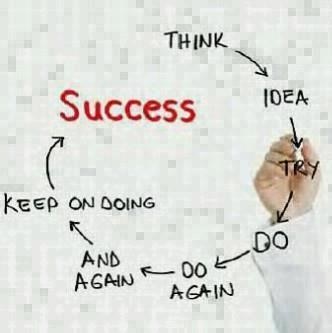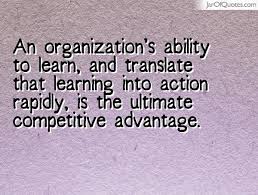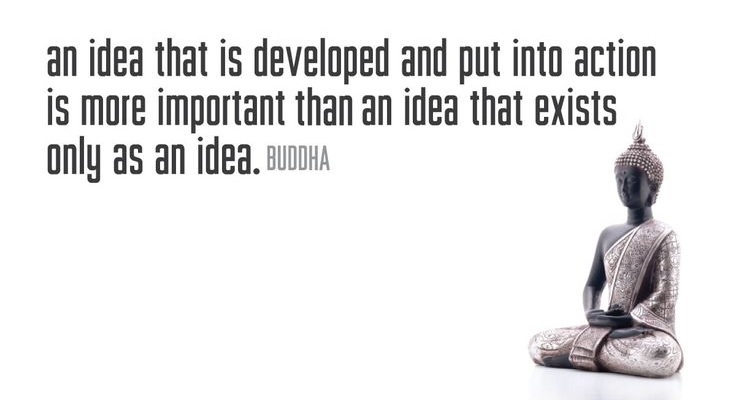 How many times have you been to a workshop or seminar and left pumped and ready to take on the world, only to realize a few weeks or months later that you haven’t even begun to use anything you’ve learned? Probably more times than you can count, right? Well, that stops today! If you want to grow personally and professionally, then reading, watching videos, and attending workshops and seminars are all great ways to start. However, it’s not nearly enough. You must put into action the things you’ve learned.
How many times have you been to a workshop or seminar and left pumped and ready to take on the world, only to realize a few weeks or months later that you haven’t even begun to use anything you’ve learned? Probably more times than you can count, right? Well, that stops today! If you want to grow personally and professionally, then reading, watching videos, and attending workshops and seminars are all great ways to start. However, it’s not nearly enough. You must put into action the things you’ve learned.
The reality is that knowledge is only power when you apply that knowledge. Think about it. You may want to be healthier, and you know that regular exercise and a healthy diet are key to your success. However, the true key is applying that knowledge by actually exercising and choosing healthy foods. So just knowing what you should do won’t get results—putting that knowledge into action will!
1.) Take notes. It may sound simple. However, studies show that people only remember about 50% of what they hear the day they hear it. That information retention decreases dramatically over a very brief period of time. Within twenty-four hours those people will have forgotten another 50%. A month later they will be able to recall less than 5% of the new material they’ve heard or read.
So take notes in a variety of colors. The brain has two sides: the logical side and the creative side. Using different-colored ink (or font, if you’re a word doc-type of note-taker) will do two things. It will utilize both sides of the brain, allowing you to learn more efficiently and allow you to easily refer back to your notes. If you’re taking notes on the “Dos and Don’ts” of something, use one color for all the dos and another for all the don’ts. Make sure your notes are legible and clear. Remember, you actually have to be able to understand them in the future.
2.) Reread your notes within twenty-four hours. I can almost guarantee that if I asked you to get your notes out from the last workshop or seminar you attended it would take you quite some time to find them if you could find them at all. Most people who attend workshops and seminars take notes; however, they end up in some binder or filing cabinet, never to even be seen again, let alone put into action. Sound familiar? Organizing your notes so that they are easy to find, organized by topic or theme, and easy to understand at any time in the future is key. Rereading your notes will allow you to retain more information at that twenty-four-hour mark. Remember, most people only retain about 25% of what they’ve heard within twenty-four hours. Rereading your notes will boost your percentage of retention.
3.) Pass on your knowledge within a week. Teaching is, by far, the best way to retain information and easily gain the ability to get it put into action. As a trainer for large corporations, I assigned different topics (products and services) to my employees to teach to other team members during our sales meetings. The “teachers” quickly became the experts on the products or services they taught. Why? The answer is simple: they knew that in order to teach others they had to know the product or service from every angle. They had to understand the product or service, how it worked, the features, the benefits, and how to offer it to potential clients. And relay that information to their peers. At each institution, when we implemented the “teaching learning” method, sales immediately began to soar as a direct result. One of the smallest offices in the most remote location increased their sales by 301% in just one quarter. They didn’t have a “sales push” on any product or service, and they didn’t hire any new salespeople. They merely became the experts on their product or service through teaching others.
4.) Stop continuously learning something new. Yes, I said stop learning something new. Our brains are only built to handle a certain amount of information at any given time. Too often, we attend every workshop, read every book, and watch every video that we think will help us learn and achieve more. “Less is more” has never been more relevant than in learning. We must learn and relearn and relearn until we become the expert. If you are reading a book, read it once all the way through to get a good idea of what the book is about. Reread the book with a highlighter, pen, or find another way to take notes. Read with intent. Search for key things that you can take away immediately. Reread the key takeaways within twenty-four hours. Finally, read the book again to see what you’ve missed. I guarantee you’ll find things you didn’t see the first few times. Once you’ve mastered the content of the book (or workshop or seminar), find someone to teach.
5.) Expect to learn. How many times have you attended a workshop or seminar only because you felt you had to? I’ve been there. The boss scheduled a training for me; the company retrained on a regular basis. We often attend or read because we think we should or because someone else thinks we should. Many times we attend a workshop and either let our minds wander to what we should be doing or focus on why we don’t actually need to be there—the old “I already know this stuff anyway,” “Why am I wasting my time here?” “I have so many other things I could be doing.” Stop the negative filtering. As humans, we are designed to find the potential problems in situations. It’s nature’s way of allowing us to defend ourselves from potentially dangerous situations. However, if you attend a workshop or read a book while using negative filtering you will block any opportunity you had to learn.
Instead, attend every workshop or seminar and read every book or article while continuously asking yourself, “How can I use this?” Make a list of what you want to gain from the material and then look for it. Just writing it down will help you get the information you really want. By writing it down you are setting your “RAS”—the reticular activating system in your brain. It’s like a compass. Remember the last time you bought a new car? Before buying the car you didn’t see many like the one you were considering on the road. However, once you’ve purchased it, voila! They are everywhere! That’s because you are consciously and unconsciously looking for that car now that you’ve purchased one and set your RAS. Learning works in the same way. You must expect to learn.
6.) Repeat, then repeat, and repeat again. If one could be a professional golfer and win the World Cup after only one lesson, everyone would be a world-class golfer. But we all know that one lesson doesn’t give us the ability to be the expert. Incredible athletes and successful business owners actually have a few things in common: they practice a craft or skill until they are the expert; they understand that anything worth doing is worth doing poorly until they can do it well; they understand that they will not become the expert at everything overnight.
If you are a business owner, you have several things to master. Focus on one area that you need to become the expert at. Then focus only on that until you’ve mastered it by repeating and repeating the action. If you need to improve your sales skill, you may want start by learning your product or service from top to bottom, the features, the benefits, the value, and how it meets a need for your customers. Interview your customers. Get feedback. Study the feedback. Once you are truly an expert on your product or service, then—and only then—should you move on to the next step in selling your product to your target market. While these are basic examples, so are the disconnects between learning and doing. We must break down our learning into simple steps, repeat the step until we are the expert at it, and then move on to the next step.
7.) Space your repetition. Have you ever crammed for a test? You stayed up all night studying, reading, and rereading. That may have helped you pass a test the next day, but that type of repetition won’t let you win in the long run. Think about advertising. Companies don’t play back-to-back commercials over a period of a couple days. They strategically place ads in different mediums, over a period of time to reinforce their message. Learning should be the same. Using different mediums over a period of time will allow you to understand, gain the information, and best apply it. Once you’ve mastered a book on a certain subject, attend a workshop on that same subject. Take good notes. Teach someone. Repeat the new learning over and over again throughout the next several months, or even years, until you know that you could be interviewed by another expert and shine!
8.) Get an accountability partner. Let’s talk about the healthy lifestyle again. You’ve taken the first step and joined a local gym. You’re actually really excited because you even went to the grocery store and filled your refrigerator with healthy food. Now what? While you’ve taken a few good steps in the right direction, it doesn’t mean that you’ll actually go to the gym on a regular basis and work out while you’re there; it doesn’t mean that you will make good food choices throughout the day while you’re not home.
This is why personal trainers are in such demand. It’s all about the accountability. If you want to become the most successful you can become, find someone to hold you accountable. Schedule a weekly or bi-weekly meeting with that person. Let them know that you will become the expert on your new learning, how you will do it, and by what date. Your accountability partner must know how you will get there. You must know how you will get there. It’s not enough to merely say, “I’m going to be the best golfer.” You’ll need to define what “being the best” means to you and put into action your plan to prove it. Plan what tools you’ll use, what milestones you’ll set, and how you’ll be held accountable. Setting a date is also extremely important. Otherwise, you could take twenty years to become the expert, and by that time the knowledge may be irrelevant. So set the expectation with your accountability partner. Meet regularly and allow them to give you constructive criticism.
9.) Get a mentor. Even top performing athletes have coaches. So should you. If you truly want to be the best of the best, hire a business coach or consultant. They will mentor you, guide you, direct you, give you much sought-after advice, and push you outside of your comfort zone. That’s when real learning happens—outside of your comfort zone.
All too often I hear business owners say, “You don’t understand. My business is different.” However, the truth is that business is business, and all businesses have the same interests and needs: a great product or service, customers who buy over and over again, strong profit margins, systems and tools that allow the company to operate efficiently and effectively, and teams of people to grow the business. So the one difference you can make in your learning and growing as a business owner that will set you apart is hiring or working with a mentor.
Working with a mentor every week will keep you on track to reach your goals, allow you to explore avenues you had not previously thought of, and give you insight into what it takes to become a true entrepreneur. I recommend hiring a professional; it’s one of the most important investments you will make as a business owner and it should provide the largest return on your investment. However, if hiring a professional isn’t in your budget right now there are other options you can put into action. Look at your connections within your community. Who would you consider to be the expert at what you want to learn? Reach out to those who already seem to have mastered the craft or skill that you want to obtain. Most people genuinely like to give. And I would guess that if you ask they will share their knowledge with you. The key is to ask them to share on a regular basis. Remember, there’s no “one and done” when it comes to learning.
10.) Change your habits. Let’s face it. We all have what we would consider good and bad habits. In order to create good habits, a few things have to come into line.
First, you must have the knowledge to put into action. You must know what to do and how to do it. Remember, you may know that you need to work out and eat better; however, you may not know what type of physical exercise and foods are best for what you want to accomplish. You may not know how to use certain equipment at the gym or how to run properly or how to cook the food you’ve purchased. Knowing what and how is vital to learning.
Second, you must have the skill set to change your habit. You may know how to use social media to market your business, but it takes you a while to create a post. The post may not generate any interest or engage your audience. It may be because you don’t have a great product or service; however, I’d venture to guess that it’s because you’re not the expert on social media. You may not understand all of the social media requirements, algorithms, analytics, and features. You just need to improve your skill set when it comes to using social media.
Finally, you must have the desire to learn. For example, I have no desire to become a mechanic, so I will not put any effort into working on my car; however, I have a great desire to share information that will change the lives of others, so I seek out how I can help others. I look for information that will give me the tools to help others achieve their goals. I read, attend workshops, get up early so I can make the best use of my time, provide workshops and seminars, work with mentors, and repeat, repeat, repeat. Why? Because I have the desire. If you want to be the best at anything you must first truly desire to be the best at it.


